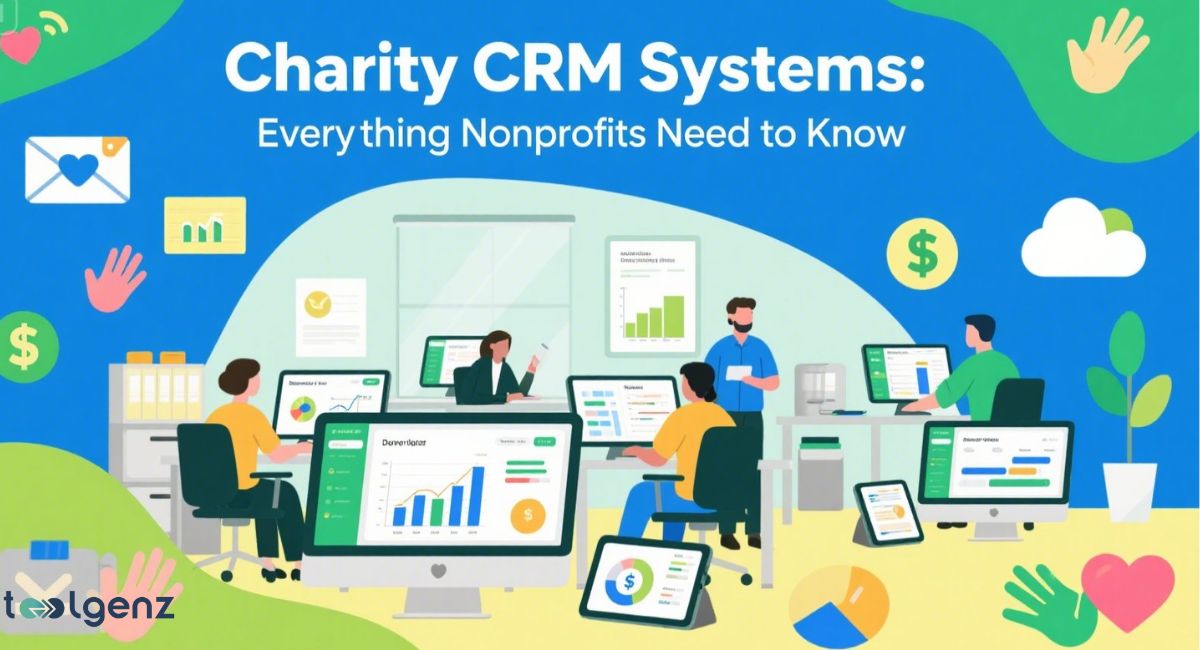Managing relationships with donors, volunteers, and supporters is essential for every nonprofit. That’s where Charity CRM systems come in.
These tools help nonprofits keep all their important data in one place, making it easier to build stronger relationships and run successful fundraising campaigns.
Whether you’re a small local group or a national organization, a charity CRM can help you grow.
With features like donor relationship management, nonprofit data management, and charity automation tools, these systems can save you time and improve results.
This guide will walk you through everything nonprofits need to know about charity CRM platforms, including costs, features, challenges, and how to choose the right one for your mission.
Choosing the right CRM system isn’t just about features—it’s about finding a solution that fits your goals and your team. In this article, we’ll also share real-world tips and comparisons to help you make the smartest decision for your nonprofit’s future.
What Is a Charity CRM System?
A charity CRM system is software that helps nonprofits manage donor data, fundraising, communication, and more.
It stands for Customer Relationship Management, but for charities, it’s all about donor relationship management. It tracks every interaction with donors, supporters, and volunteers.
Charity CRM systems are not just contact databases. They help you manage donations, events, emails, and reporting. You can run campaigns, segment supporters, and even track volunteer hours.
How does a charity CRM work? It connects different tools together, giving you a full view of your donors.
Charity CRMs also bring teams together, making it easier to share updates and stay aligned. With cloud access, your nonprofit staff can view reports, insights, and supporter info in real time—whether they’re in the office or working remotely. This makes your organization more agile and responsive to donor needs.
How a CRM System Helps Charities
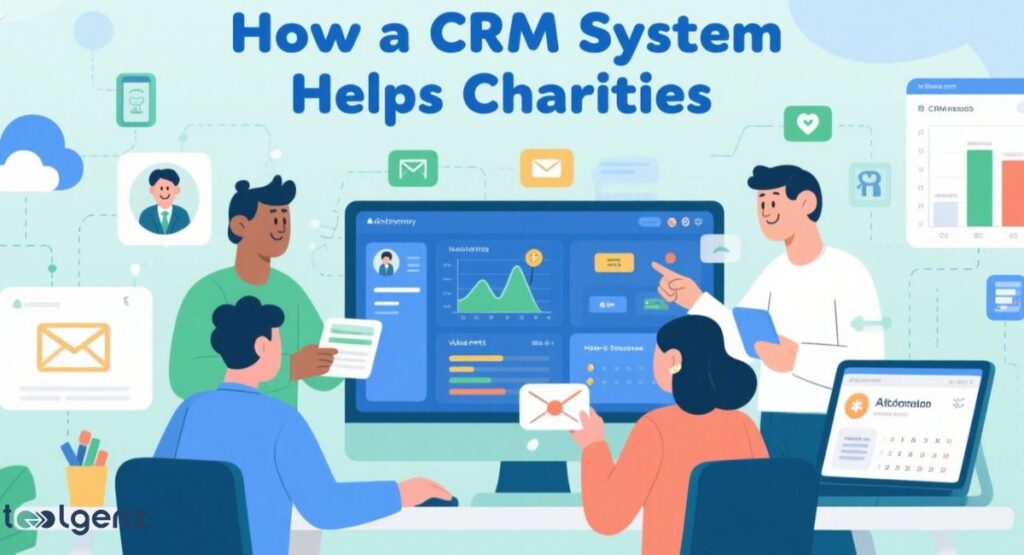
For smaller charities, a CRM can be a real game-changer. It takes care of repetitive tasks behind the scenes so your team can focus on what matters most—your mission.
You can set up reminders, send automated emails, and track every donation. This improves accuracy and saves time.
It also boosts donor engagement. With a good donor engagement platform, you can send personalized messages, update supporters on progress, and increase donations.
These systems include features like tools to improve donor retention and charity automation tools that help maintain strong relationships.
If your nonprofit depends on monthly donations, a CRM built for regular giving can make things run much smoother. It ensures recurring donations are processed smoothly and supporters feel connected to your cause every step of the way.
Key Features to Look for in a Charity CRM
What to look for in a CRM for charities? Start with features that match your needs. You should be able to manage contacts, track donations, and run reports.
A good system includes campaign tracking software, volunteer management system, and event registration CRM.
Look for features like automated emails and built-in top tools to keep in touch with your donors—these help you stay connected and save time.
It should support Gift Aid management, allow for charity finance reconciliation, and provide a useful charity reporting dashboard. Also check for GDPR compliant CRM tools to handle privacy rules.
You’ll also want CRM integration tools that connect easily with platforms like Mailchimp, accounting software, and online donation pages. These features ensure everything works together, helping your team stay organized and focused on your mission.
The Best CRM for Charities (Free and Paid Options)
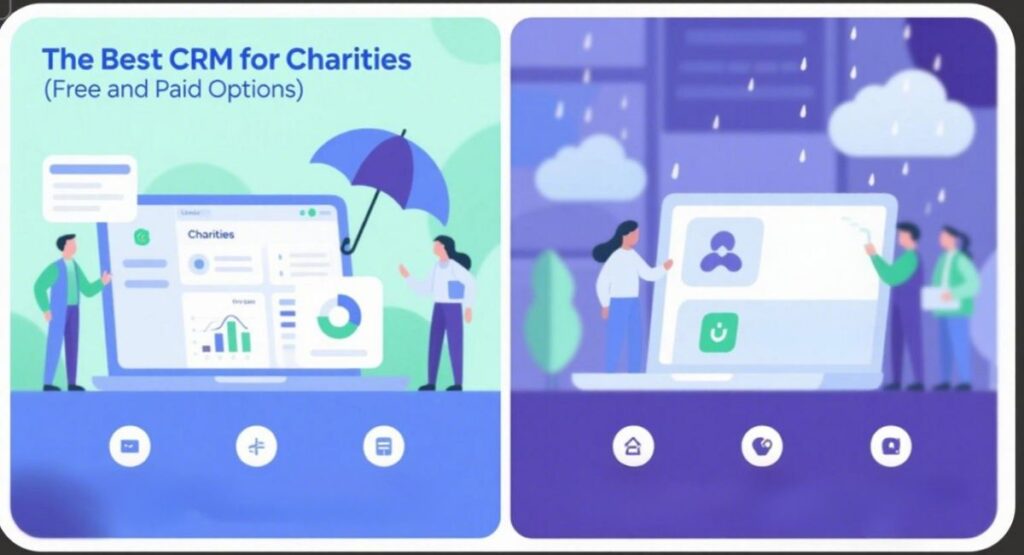
There are many good options. Some offer more features, while others are budget-friendly. The top CRM platforms for micro charities include:
| CRM Platform | Free Plan | Best For | Notable Features |
| Salesforce NPSP | Yes | Large charities | Custom reports, campaign management |
| Bloomerang | No | Medium nonprofits | Donor retention tools, email automation |
| DonorPerfect | No | Established fundraising teams | CRM software for regular giving programs |
| Neon CRM | No | Growing nonprofits | Strong donor segmentation tools |
| Kindful | No | Visual dashboard needs | Mailchimp integration, gift tracking |
| Raisely | Yes | Small to mid-size nonprofits | Is Raisely good for nonprofit campaigns? Yes |
We are not affiliated with these platforms. Each platform has pros and cons. It depends on your budget and size.
Free CRM for Charities: What Are Your Options?
Not every nonprofit has money to spend. Luckily, there are best free CRM for nonprofit fundraising options. These let you get started without spending a dime.
Affordable CRM for small nonprofits like CiviCRM or Raisely provide core features like contact tracking and donation history.
Some free tools also offer add-ons for email marketing, volunteer tracking, or CRM that supports Gift Aid claims. Others like Zoho for Nonprofits offer a free tier with basic automation. These can be enough for early-stage charities.
If your organization plans to grow, look for free CRMs that also scale. Top CRM platforms for micro charities often allow upgrades later, so you won’t need to migrate charity data to a new CRM when your needs expand.
Choosing the Right Charity CRM System
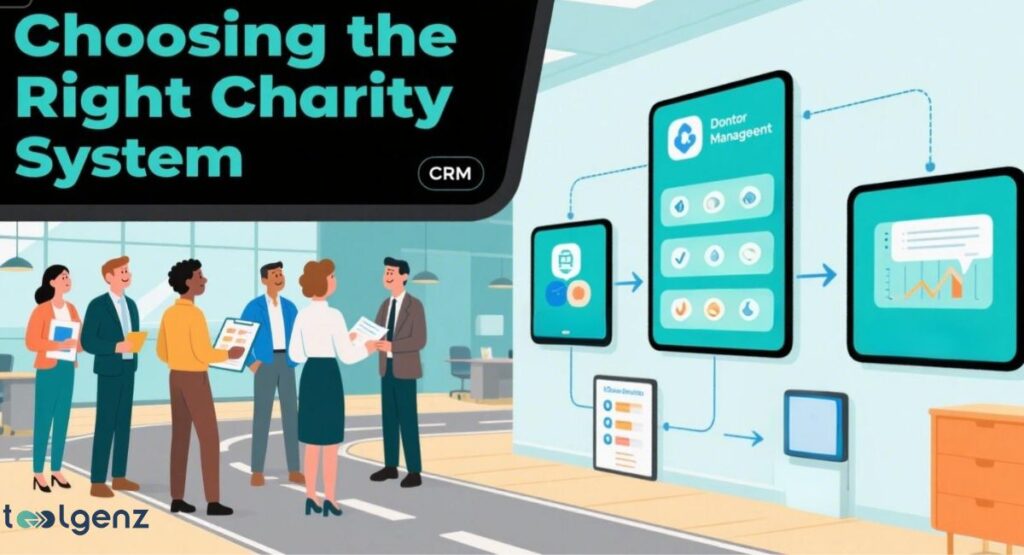
How to pick the right CRM for my charity depends on your needs. Start by listing your must-haves. Do you need email automation, donor history, or predictive donor analytics? Consider your staff’s tech skills and time.
Then test a few systems. Many offer free trials. Look for easy-to-use CRM for fundraising teams with good support and learning materials. If your charity is growing, pick a system that scales with you.
Also, explore cloud-based CRM for nonprofit teams that allow remote access and updates from anywhere. This flexibility is essential for modern nonprofits working across locations or with hybrid teams.
Charity CRM System Pricing: What Should You Expect?
CRM pricing varies a lot. Some charge per user, while others charge by the number of contacts. Here’s a simple breakdown of what you might pay:
| Plan Type | Monthly Cost (USD) | Best For |
| Free | $0 | Small charities, new nonprofits |
| Basic | $20–50 | Micro to mid-size teams |
| Advanced | $50–200+ | Medium to large nonprofits |
| Enterprise | $200+ | High-volume fundraising teams |
Also watch for setup fees, training, or CRM integration tools. The right system pays off by saving time and helping raise more funds.
Common Challenges with Charity CRM Systems
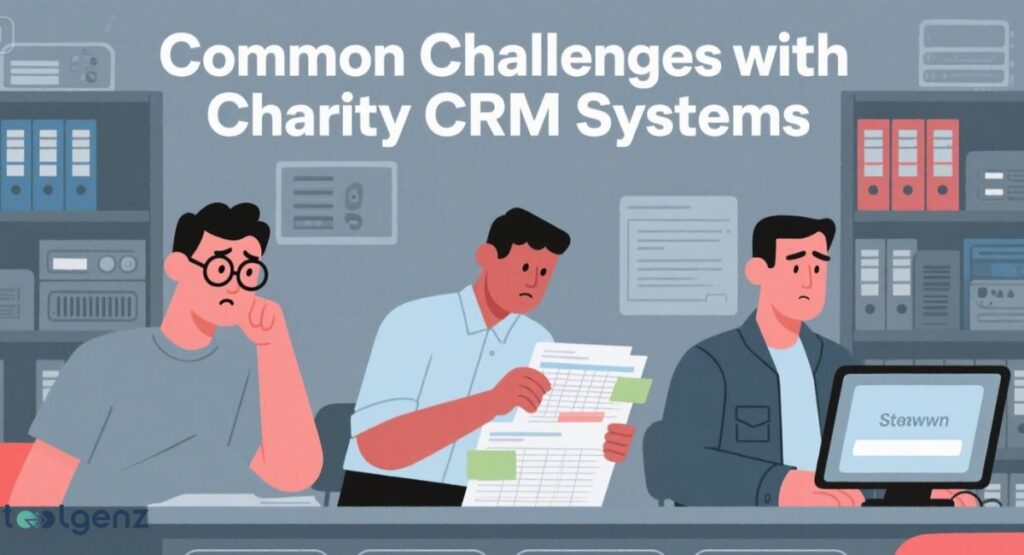
Many nonprofits struggle when starting with a new system. How to migrate charity data to a new CRM is a common concern.
You might face issues moving old spreadsheets, contact info, or donation history. Some vendors offer help with data migration.
Training can also be a hurdle. If the system’s too complicated, your team might hesitate to use it. Look for systems that offer onboarding, live chat, or video support.
And with a cloud-based CRM, your team can log in and stay updated no matter where they’re working from.
To avoid problems, choose a CRM with CRM integration tools that can connect to your current platforms like email, finance, or marketing. This can make the transition much smoother and save time.
How Much Should a Fundraising CRM Cost?
There’s no one-size-fits-all price. But for small charities, expect to spend between $0 and $75 per month. Larger organizations may spend more based on features. It also depends on the type of fundraising you do.
A CRM system that helps manage donations can help you raise more. Think of it as an investment. With the right fundraising campaign optimization, you can track results, engage more donors, and plan better.
Some tools also offer budget-friendly CRM for donor management packages, especially for those focused on recurring giving. Always compare total value, not just price, when evaluating options.
What Is Raisely’s CRM and How Does It Compare to Others?
Is Raisely good for nonprofit campaigns? Yes, especially for those who want a free yet powerful tool. Raisely is cloud-based and focused on fundraising. It offers donation pages, peer-to-peer campaigns, and supporter tracking.
Compared to paid tools, Raisely holds up well. It doesn’t have all the features of Salesforce, but it’s easier to use. Plus, it’s an affordable CRM for small nonprofits with many great tools built-in. You can even run Direct Debit for nonprofits through it.
For charities looking to scale, Raisely also supports donor segmentation and simple CRM integration tools, making it a smart choice for growing campaigns.
Final Thoughts
Charity CRM systems help you grow your mission. They streamline nonprofit data management, improve donor communication, and allow smarter decisions through charity data analytics.
Whether you choose a free or paid system, the right CRM can transform how your charity works.
Choose wisely, keep your team trained, and don’t be afraid to try something new. The future of fundraising depends on smart tools and better engagement. Start your journey with the best system for your needs today.
With features like donor segmentation, fundraising campaign optimization, and CRM software for regular giving programs, a well-chosen platform can unlock new potential. Invest in a solution that fits your goals—and your supporters will feel the difference.
FAQs
What is the best CRM for charities?
The best CRM for charities depends on your size and needs, but popular options include Salesforce Nonprofit Cloud, Bloomerang, and Raisely.
Is Salesforce free for charities?
Yes, Salesforce offers 10 free licenses to eligible nonprofits through its Power of Us program.
What is a charity CRM?
A charity CRM is software that helps nonprofits manage donors, track fundraising, organize volunteers, and improve communication.
What is the best database for small charities?
Affordable options like CiviCRM, Little Green Light, and Zoho for Nonprofits are ideal for small charities.
Who is the no. 1 CRM provider?
Salesforce is widely regarded as the No. 1 CRM provider globally due to its features, scalability, and market share.


